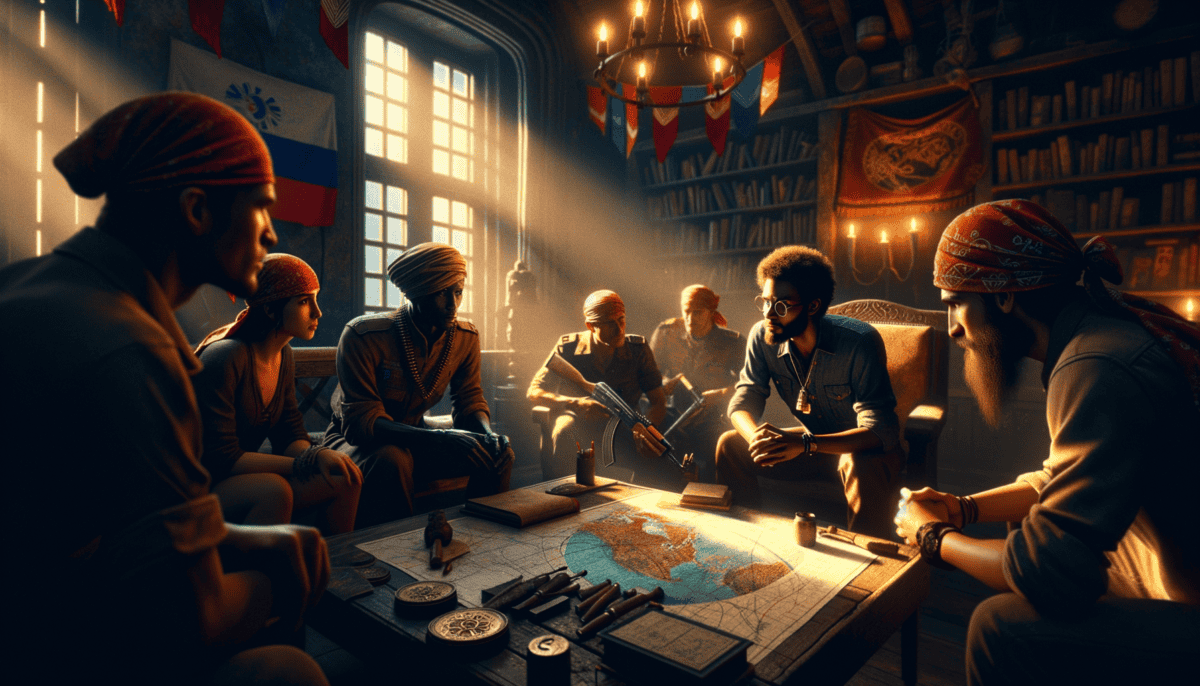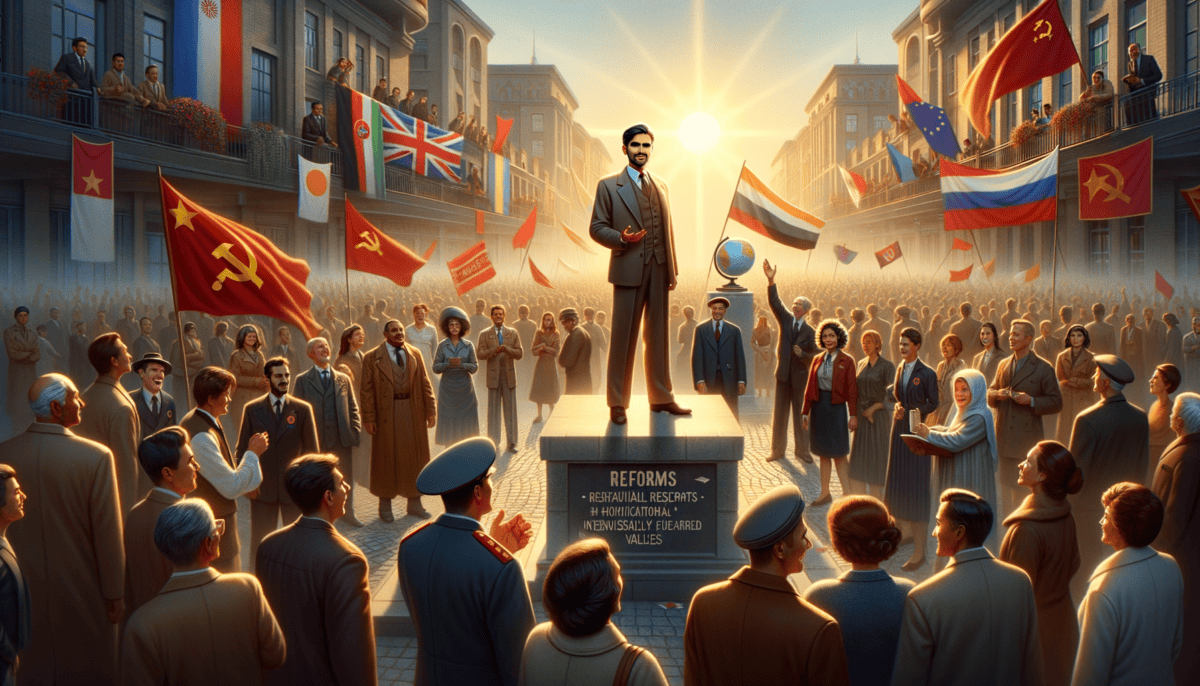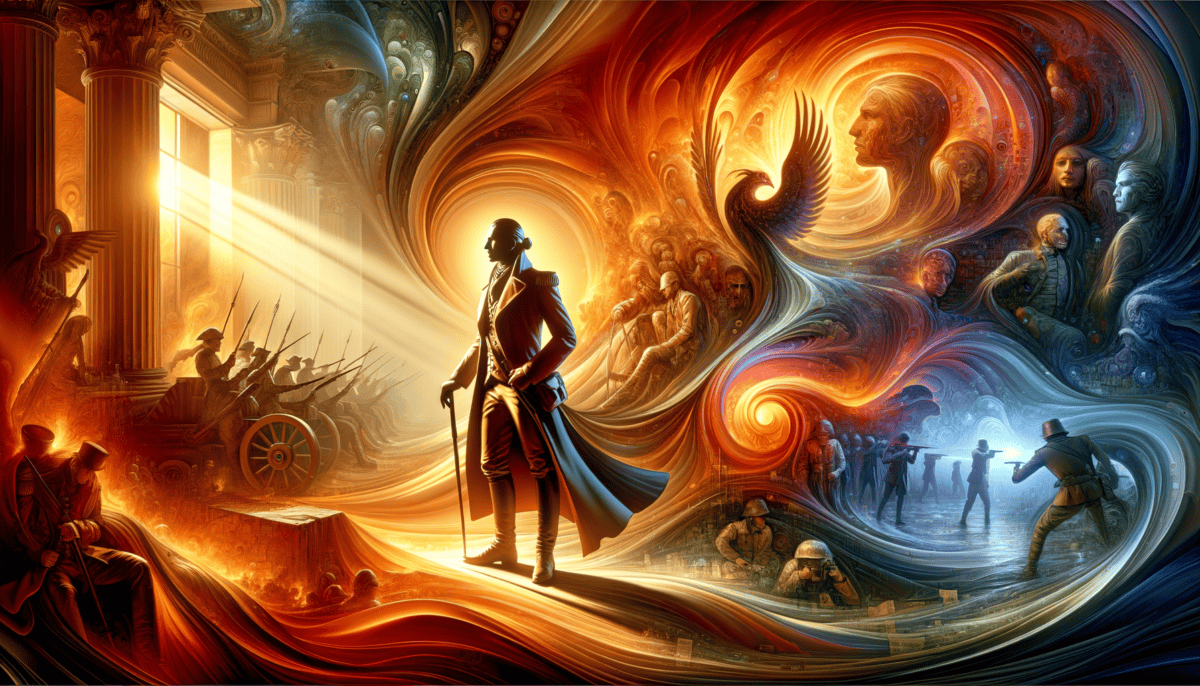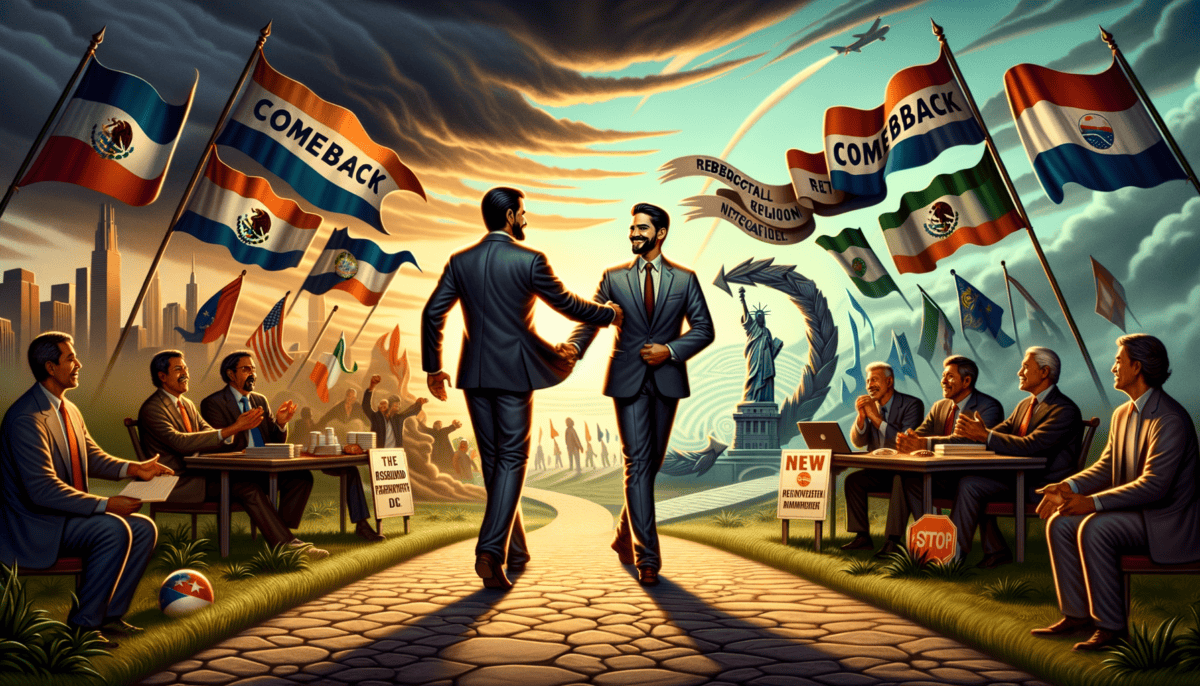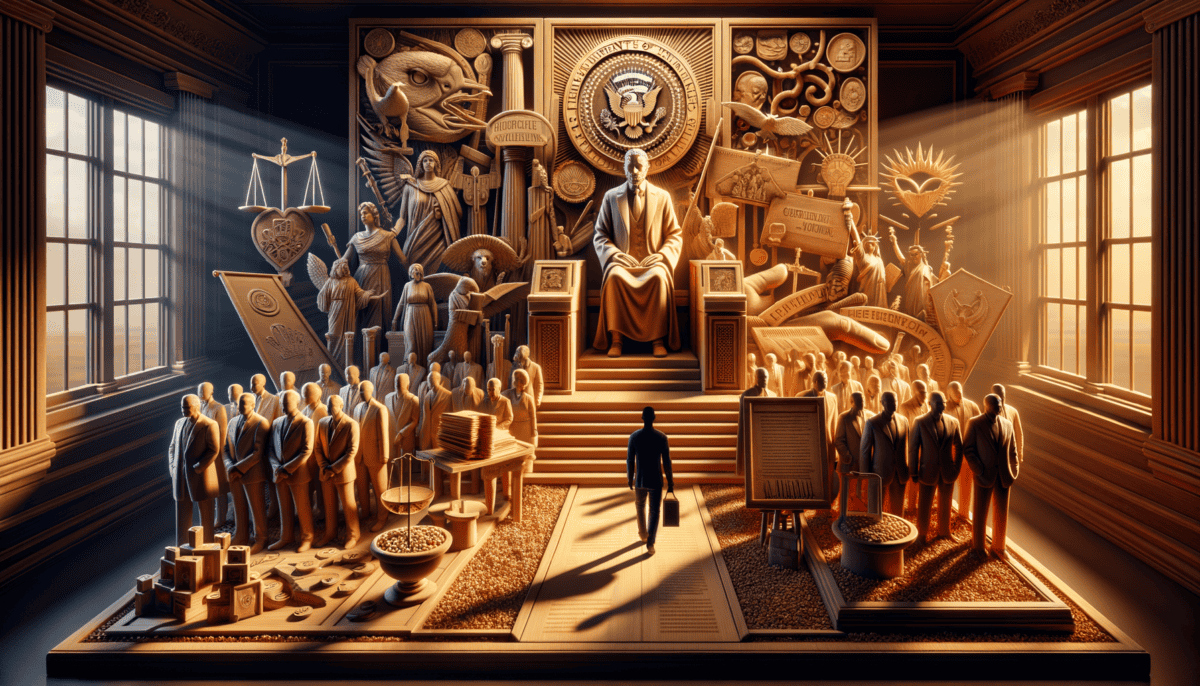Growing Up Poor in Nicaragua
Little Daniel woke up early one morning in 1950 to help his mama sweep their tiny home in La Libertad, Nicaragua. He was only five years old, but he already knew what it meant to be poor.
"Mama, why don't we have nice things like some other families?" Daniel asked, his small hands gripping the too-big broom.
His mother Lidia paused her work and knelt beside him. "Mi hijo, we may not have much money, but we have something more important – we have each other and hope for a better tomorrow."
Daniel's childhood home was simple – just a few rooms with dirt floors. His father Daniel Sr. worked hard as a cotton farmer, but they still struggled to buy food and clothes. Young Daniel often went to bed hungry, his tummy making angry growls in the dark night.
“The poor people of Nicaragua were treated very badly back then. We didn’t have good schools or doctors or even enough food to eat.” – Daniel Ortega, remembering his childhood
Life got even harder when Daniel's father was arrested by soldiers working for President Somoza. Daniel was only seven years old when he watched them take his papa away. His mother cried many nights, worried about how she would feed her children alone.
These early experiences shaped young Daniel's view of the world. He saw how unfair life was for poor families like his. While the president and his friends lived in big mansions, regular people could barely survive.
Daniel started asking lots of questions:
• Why were some people so rich while others had nothing?
• Why did the soldiers hurt people who spoke up?
• How could things change to make life better?
As he grew older, Daniel met people who talked about making Nicaragua a fairer place. They whispered about something called "revolution" – where the poor people would rise up against the rich rulers who treated them badly.
"One day," Daniel promised himself, "I will help make things different. No child should have to go hungry like I did."
His mother noticed how serious her son had become. "Daniel has an old soul," she told the neighbors. "He feels the pain of others as if it were his own."
At school, when Daniel learned to read and write, he started reading books about heroes who fought for justice. He dreamed of being like them someday. Other kids played games at recess, but Daniel often sat alone, thinking about big ideas.
The First Spark of Revolution
One hot afternoon, when Daniel was twelve, he saw something that changed his life forever. A group of poor farmers were protesting because their land had been taken away. The police came with big sticks and guns.
"Stop! They're just hungry!" young Daniel shouted. But his voice was lost in the chaos as the police attacked the peaceful farmers.
That night, Daniel couldn't sleep. His hands were clenched into tight fists under his thin blanket. He made a promise to himself that would shape his whole future: "When I grow up, I will fight for the poor people of Nicaragua. No matter what it takes."
Little did anyone know that this poor boy from La Libertad would grow up to lead a revolution that would change Nicaragua forever. But on that night in 1957, he was just a child with a dream of justice, lying awake and planning how to make his country a better place.
The Young Revolutionary
The year was 1963, and Daniel Ortega was now eighteen years old. His heart beat fast as he walked into his first secret meeting of the Sandinista National Liberation Front (FSLN).
“Welcome, companero,” whispered Carlos, an older student with fire in his eyes. “Are you ready to fight for Nicaragua’s freedom?”
The small room was filled with young people like Daniel, all dreaming of a better Nicaragua. They sat on wooden crates and listened to stories about Augusto Sandino, a brave hero who had fought against powerful rulers years ago.
“When I joined the Sandinistas, I wasn’t just joining a group – I was joining a dream for a free Nicaragua.”
Daniel learned quickly. During the day, he worked odd jobs to avoid suspicion. But at night, he became a different person. He learned to:
- Send secret messages
- Hide from Somoza’s police
- Help other rebels move safely through the city
- Share food with poor families
- Plan peaceful protests
Living in the Shadows
Life as a young rebel was dangerous. Daniel often slept in different places to stay safe. Sometimes he stayed with kind families who supported the revolution. Other times, he hid in barns or empty buildings.
“Mama, I have to do this,” he told his worried mother one night. “Someone needs to stand up to the bad people hurting Nicaragua.”
His mother hugged him tight. “Be careful, mi hijo. Your father would be proud of your brave heart.”
The Price of Fighting Back
One dark night in 1967, everything changed. Daniel was carrying important papers for the rebels when police spotted him. His heart pounded as he ran through narrow streets, but they caught him.
“You’re going to prison, little rebel,” the police officer sneered.
Daniel spent seven long years in a tiny prison cell. But even there, he didn’t give up. He read books, taught other prisoners to read, and made plans for the future. The prison walls couldn’t hold his dreams of freedom.
Life in prison was hard, but it made Daniel stronger. He wrote in his journal:
“These walls can lock up my body, but they can’t lock up my ideas. Someday, Nicaragua will be free.”
When Daniel finally got out of prison in 1974, he was more determined than ever to change Nicaragua. He wasn’t just a young rebel anymore – he was becoming a leader. People listened when he spoke about making Nicaragua better.
“The time for change is coming,” he told his fellow rebels. “We must be ready.”
Daniel worked harder than ever, meeting with workers, farmers, and students. He helped organize peaceful protests and taught others about standing up for their rights. The movement was growing stronger every day.
In the quiet moments, Daniel would look at the stars and remember that hungry little boy from La Libertad. He was still fighting for that boy, and for all the other children who went to bed hungry in Nicaragua.
The revolution was getting closer, and Daniel Ortega was ready to play his part in Nicaragua’s big change. The scared young man who had first walked into that secret meeting was becoming someone much more important – a leader who would help shape his country’s future.
Dreams of Change Take Flight
The morning sun rose over Managua on July 19, 1979. Daniel Ortega stood with his fellow rebels as cheers filled the streets. After years of fighting, they had finally won!
“We did it!” shouted Maria, a young rebel fighter, hugging Daniel. “Somoza is gone!”
A New Beginning
The first days were full of joy and hope. People danced in the streets and waved red and black Sandinista flags. Daniel could hardly believe his eyes. The dream he had fought for was coming true.
“Today marks a new chapter for Nicaragua. No more will our children go hungry. No more will our people live in fear.” – Daniel’s first speech as leader
But being a leader was different from being a rebel. Daniel and his friends now had big jobs to do:
- Help poor families get food
- Build new schools
- Give farmers land to grow crops
- Make sure everyone could see a doctor
- Keep Nicaragua safe
Making Changes
Daniel worked hard to keep his promises. Teachers went to small villages to help people learn to read. Doctors traveled to help sick people who had never seen a doctor before.
“Look, Mama!” said a small girl, showing her mother a book. “I can read now!”
These were happy times, but they weren’t easy. Some countries, especially the United States, didn’t like the changes Daniel and the Sandinistas were making. They worried Nicaragua was becoming too friendly with Cuba and the Soviet Union.
Storm Clouds Gather
One day, Daniel got some worrying news. “Sir,” said his advisor, “there are groups forming to fight against us. They’re called the Contras.”
The United States was helping these groups. They didn’t want Nicaragua to be friends with Cuba and other communist countries. Dark clouds were gathering over Daniel’s dreams for Nicaragua.
“We just want to build a better country for our people. Why can’t they understand that?” Daniel wrote in his diary
Standing Strong
Despite the challenges, Daniel kept working. He traveled around Nicaragua, talking to farmers, workers, and families. “We must stay strong,” he would say. “We’ve come too far to give up now.”
He visited a new school in the mountains. The children ran to greet him, showing off their new books and pencils. Their smiles reminded him why he had fought so hard for change.
“Senor Ortega,” asked a little boy, “will we always have our school now?”
Daniel knelt down beside him. “Yes, mi hijo. Education is your right. No one can take that away.”
But keeping these promises would get harder. The fight against the Contras was using up money that could have helped build more schools and hospitals. The dream of a peaceful, prosperous Nicaragua seemed to be slipping away.
As the sun set over Managua each evening, Daniel would look out at the city lights and wonder what tomorrow would bring. The revolution had succeeded, but now came the harder task – turning revolutionary dreams into reality while facing powerful enemies.
Dreams Under Fire
Dark clouds rolled over Nicaragua in the early 1980s. Daniel Ortega’s hopes for peace were fading as the sounds of war returned. ️
The Storm Begins
“More villages were attacked last night,” Maria reported, spreading a map across Daniel’s desk. Red marks showed where the Contras had struck. There were too many red marks.
“How can we build schools when we must spend money on guns?” Daniel whispered, his voice heavy with worry.
The war was expensive. Nicaragua needed money for:
- Food for hungry families
- Medicine for the sick
- Guns to fight the Contras
- Help for farmers
- Repairs to broken buildings
Hard Choices
Daniel spent long nights in his office. The lamp burned as he tried to find answers. Should he buy food for children or bullets for soldiers? Both were needed to keep people safe.
“Remember why we fought,” his friend Carlos said one day. “The people still believe in our dream.”
But the dream was getting harder to hold onto. The United States put rules in place that made it hard for Nicaragua to sell things to other countries. This meant less money for food and medicine.
The People’s Voice
In 1990, something big happened. It was time for a new election. Daniel thought the people would want him to stay as leader. But he was wrong.
“The people have chosen Violeta Chamorro,” the radio announced. Daniel’s heart sank. After all the fighting, after all the dreams, he had lost.
“What will you do now?” a reporter asked him.
Daniel stood tall and said, “I will respect what the people want. That’s what democracy means.”
Time to Think
Now Daniel had time to think about what went wrong. He walked the streets of Managua, looking at the faces of people hurrying past. Some still smiled and waved. Others turned away.
In his quiet moments, he wrote in his diary: “Maybe we tried to change too much too fast. Maybe we forgot to listen to what some people wanted.”
Learning and Changing
Daniel didn’t give up. He started to change how he thought about things. Maybe there was a way to help poor people without making rich people angry. Maybe there was a way to make Nicaragua better that more people would like.
“We must learn from our mistakes,” he told his supporters. “We must find a new way forward.”
He spent years watching and waiting. He saw how other countries helped their people. He thought about how to do things differently if he ever got another chance.
At night, he would look at old photos from the revolution. The young rebel who fought for change was now older and wiser. The fire in his eyes was still there, but now it burned with a different kind of wisdom.
“One day,” he promised himself, “I will lead again. But next time, I will do it differently.”
The years of opposition weren’t easy, but they taught Daniel important lessons. Sometimes losing can teach you more than winning. Sometimes stepping back helps you see the way forward more clearly.
A New Dawn Rises
The year was 2007. Daniel Ortega stood before a cheering crowd in Managua. After 17 years of waiting, he was president again!
Different Times, Different Daniel
This wasn’t the same Daniel who wore army clothes and talked about revolution. Now he wore colorful shirts and spoke about peace. His wife Rosario stood beside him, wearing bright pink.
“Nicaragua needs love, not war,” Daniel told the people. “We will help everyone – poor and rich together.”
He had made new friends too. Hugo Chavez, the leader of Venezuela, gave Nicaragua something very important:
- Money for food programs
- Oil to make electricity
- Help building new houses
- Support for farmers
- Aid for schools
Making Changes
Daniel worked to make life better in Nicaragua. More kids went to school than before. More people got medicine when they were sick. Some poor families got new homes.
“Look how Nicaragua is growing!” Rosario would say on TV. The streets of Managua had new stores and restaurants.
But some people worried. They remembered the old days and wondered if Daniel had really changed.
Power and Family
Daniel’s family became very important in Nicaragua’s government. His children got big jobs. Rosario became more than just his wife – she helped make many decisions.
“We are one big family,” Daniel would say. “All of Nicaragua is our family.”
Growing Control
As years passed, Daniel made more rules that kept him in charge. Some people didn’t like this. They wanted other people to have a chance to be president too.
One day, a young student asked, “Why do you need so much power?”
Daniel answered, “To make sure our progress continues. To protect what we’ve built.”
Friends and Critics
Some countries liked what Daniel was doing. They saw more poor people getting help. But other countries worried. They said Nicaragua needed more freedom, more chances for different ideas.
In the streets of Managua, you could hear different voices:
“My grandmother got her first real house thanks to Daniel!” said Maria.
“But what about letting other people lead sometimes?” asked Carlos.
Looking Forward
As the sun set over Managua each evening, Daniel would look out from his office. The city had changed so much since his rebel days. He had changed too.
Some dreams from his youth had come true – helping poor people, building schools. But new questions faced Nicaragua. Could helping people and having strong control work together? Would Nicaragua’s future be bright or dark?
Daniel’s story wasn’t over. Like Nicaragua itself, it was still being written, one page at a time.
The Weight of Power
The sun rises over Nicaragua in 2023. Daniel Ortega sits in his presidential office, looking at old photos. He sees himself as a young rebel, then as president, and now as Nicaragua’s longest-serving leader.
A Changed Country
Nicaragua today is very different from the country Daniel once fought to change. Big buildings shine in Managua. More roads connect cities. But something else has changed too – the way people feel about their leader.
“When I was little, my parents told me Daniel was a hero,” says Maria, a teacher. “Now, many people are afraid to speak freely.”
Family Rule
The Ortega family has become like royalty in Nicaragua. Rosario, Daniel’s wife, isn’t just the First Lady – people call her “La Compañera Vice Presidenta” (The Vice President Partner). Their children run big companies and make important decisions.
A young student whispers, “It’s like having kings and queens, not presidents.”
Tough Choices
In recent years, Daniel has made choices that worry many people:
• He closed newspapers that said bad things about him
• He put some people who wanted his job in jail
• He made it hard for other parties to win elections
World Watching
Other countries look at Nicaragua with concern. The United States says Daniel isn’t being fair. Even old friends don’t support him like before. Venezuela, once a close ally, has its own problems now.
“Remember when we dreamed of freedom?” asks Carlos, an old revolutionary friend. “What happened to those dreams?”
Looking Back and Forward
Daniel’s journey has been long and winding. From a poor boy to a rebel fighter. From a revolutionary leader to a controversial president. Some things he promised came true – more schools, better hospitals. But other promises about democracy and freedom seem forgotten.
Young Nicaraguans today learn different stories about Daniel Ortega:
“He helped poor people,” says one history book.
“He kept too much power,” says another.
The Final Chapter?
As the sun sets over Managua, Daniel Ortega’s story teaches us something important: Power can change people. The young rebel who wanted to free his country became a leader who holds tight to control. The fighter for democracy now limits other voices.
Nicaragua’s future remains uncertain. Will new leaders bring back the dreams of freedom? Will the country find a balance between helping people and letting them speak freely?
The story of Daniel Ortega reminds us that fighting for change is one thing, but using power wisely is another. It shows how dreams can change, and how yesterday’s hero can become tomorrow’s puzzle.
As night falls over Nicaragua, new voices whisper new dreams for their country’s future. The next chapter waits to be written.


